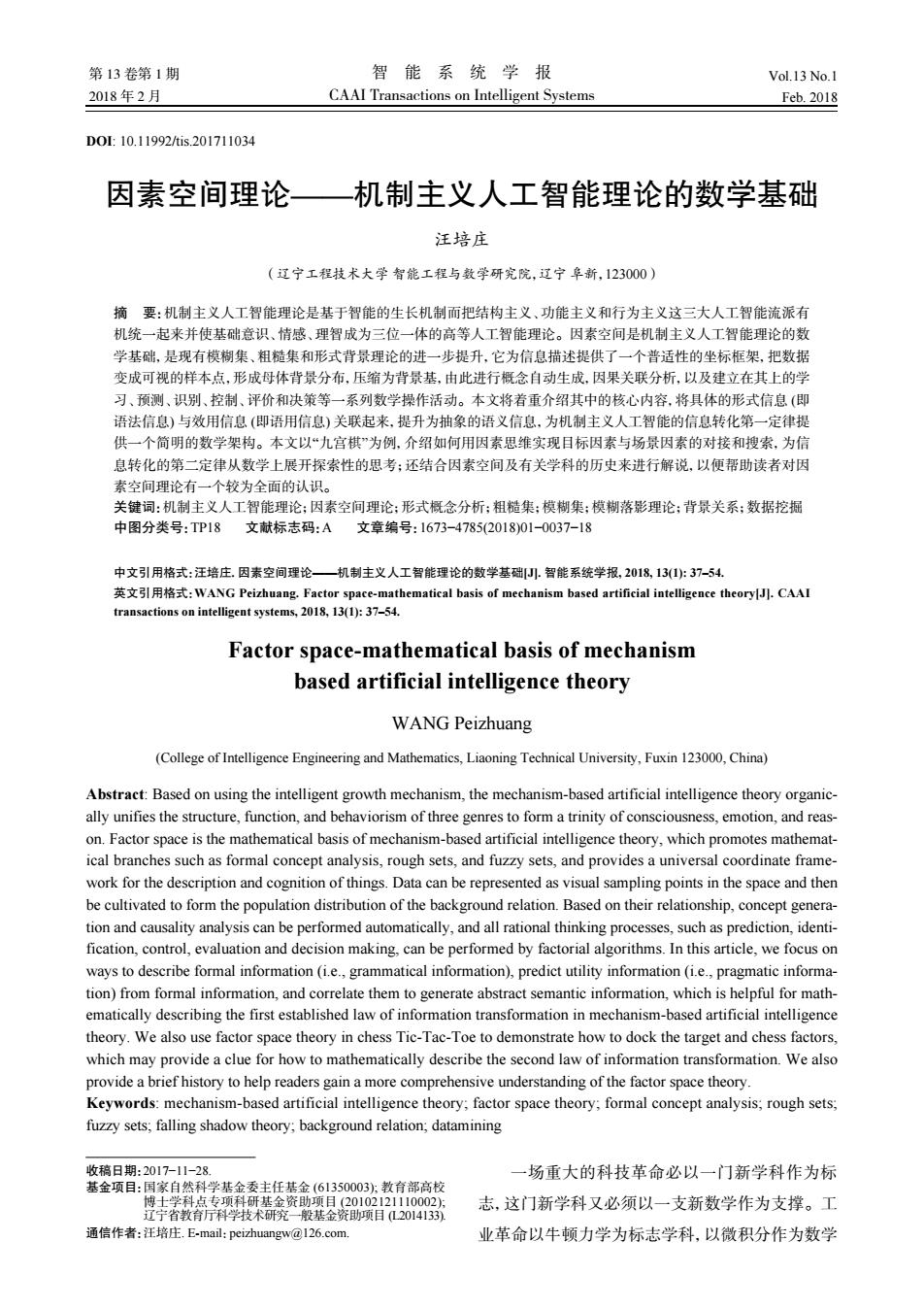正在加载图片...

第13卷第1期 智能系统学报 Vol.13 No.I 2018年2月 CAAI Transactions on Intelligent Systems Feb.2018 D0L:10.11992/tis.201711034 因素空间理论 机制主义人工智能理论的数学基础 汪培庄 (辽宁工程技术大学智能工程与数学研究院,辽宁阜新,123000) 摘要:机制主义人工智能理论是基于智能的生长机制而把结构主义、功能主义和行为主义这三大人工智能流派有 机统一起来并使基础意识、情感、理智成为三位一体的高等人工智能理论。因素空间是机制主义人工智能理论的数 学基础,是现有模糊集、粗糙集和形式背景理论的进一步提升,它为信息描述提供了一个普适性的坐标框架,把数据 变成可视的样本点,形成母体背景分布,压缩为背景基.由此进行概念自动生成.因果关联分析,以及建立在其上的学 习、预测、识别、控制、评价和决策等一系列数学操作活动。本文将着重介绍其中的核心内容,将具体的形式信息(即 语法信息)与效用信息(即语用信息)关联起来,提升为抽象的语义信息,为机制主义人工智能的信息转化第一定律提 供一个简明的数学架构。本文以“九宫棋”为例,介绍如何用因素思维实现目标因素与场景因素的对接和搜索,为信 息转化的第二定律从数学上展开探索性的思考;还结合因素空间及有关学科的历史来进行解说,以便帮助读者对因 素空间理论有一个较为全面的认识。 关键词:机制主义人工智能理论;因素空间理论:形式概念分析;粗糙集;模糊集;模糊落影理论;背景关系;数据挖掘 中图分类号:TP18文献标志码:A文章编号:1673-4785(2018)01-0037-18 中文引用格式:汪培庄.因素空间理论一机制主义人工智能理论的数学基础J.智能系统学报,2018,131):37-54。 英文引用格式:VANG Peizhuang.Factor space-.mathematical basis of mechanism based artificial intelligence theoryJ].CAAl transactions on intelligent systems,2018,13(1):37-54. Factor space-mathematical basis of mechanism based artificial intelligence theory WANG Peizhuang (College of Intelligence Engineering and Mathematics,Liaoning Technical University,Fuxin 123000,China) Abstract:Based on using the intelligent growth mechanism,the mechanism-based artificial intelligence theory organic- ally unifies the structure,function,and behaviorism of three genres to form a trinity of consciousness,emotion,and reas- on.Factor space is the mathematical basis of mechanism-based artificial intelligence theory,which promotes mathemat- ical branches such as formal concept analysis,rough sets,and fuzzy sets,and provides a universal coordinate frame- work for the description and cognition of things.Data can be represented as visual sampling points in the space and then be cultivated to form the population distribution of the background relation.Based on their relationship,concept genera- tion and causality analysis can be performed automatically,and all rational thinking processes,such as prediction,identi- fication,control,evaluation and decision making,can be performed by factorial algorithms.In this article,we focus on ways to describe formal information(i.e.,grammatical information),predict utility information(i.e.,pragmatic informa- tion)from formal information,and correlate them to generate abstract semantic information,which is helpful for math- ematically describing the first established law of information transformation in mechanism-based artificial intelligence theory.We also use factor space theory in chess Tic-Tac-Toe to demonstrate how to dock the target and chess factors, which may provide a clue for how to mathematically describe the second law of information transformation.We also provide a brief history to help readers gain a more comprehensive understanding of the factor space theory. Keywords:mechanism-based artificial intelligence theory;factor space theory;formal concept analysis;rough sets; fuzzy sets;falling shadow theory;background relation;datamining 收稿日期:2017-11-28. 一场重大的科技革命必以一门新学科作为标 基金项目:国家自然科学基金委主任基金(61350003),教育部高校 博士学科点专项科研基金资助项目(20102121110002): 志,这门新学科又必须以一支新数学作为支撑。工 辽宁省教育厅科学技术研究一般基金资助项目L2014133) 通信作者:汪培庄.E-mail:peizhuangw(@126.com. 业革命以牛顿力学为标志学科,以微积分作为数学DOI: 10.11992/tis.201711034 因素空间理论——机制主义人工智能理论的数学基础 汪培庄 (辽宁工程技术大学 智能工程与数学研究院,辽宁 阜新,123000) 摘 要:机制主义人工智能理论是基于智能的生长机制而把结构主义、功能主义和行为主义这三大人工智能流派有 机统一起来并使基础意识、情感、理智成为三位一体的高等人工智能理论。因素空间是机制主义人工智能理论的数 学基础,是现有模糊集、粗糙集和形式背景理论的进一步提升,它为信息描述提供了一个普适性的坐标框架,把数据 变成可视的样本点,形成母体背景分布,压缩为背景基,由此进行概念自动生成,因果关联分析,以及建立在其上的学 习、预测、识别、控制、评价和决策等一系列数学操作活动。本文将着重介绍其中的核心内容,将具体的形式信息 (即 语法信息) 与效用信息 (即语用信息) 关联起来,提升为抽象的语义信息,为机制主义人工智能的信息转化第一定律提 供一个简明的数学架构。本文以“九宫棋”为例,介绍如何用因素思维实现目标因素与场景因素的对接和搜索,为信 息转化的第二定律从数学上展开探索性的思考;还结合因素空间及有关学科的历史来进行解说,以便帮助读者对因 素空间理论有一个较为全面的认识。 关键词:机制主义人工智能理论;因素空间理论;形式概念分析;粗糙集;模糊集;模糊落影理论;背景关系;数据挖掘 中图分类号:TP18 文献标志码:A 文章编号:1673−4785(2018)01−0037−18 中文引用格式:汪培庄. 因素空间理论——机制主义人工智能理论的数学基础[J]. 智能系统学报, 2018, 13(1): 37–54. 英文引用格式:WANG Peizhuang. Factor space-mathematical basis of mechanism based artificial intelligence theory[J]. CAAI transactions on intelligent systems, 2018, 13(1): 37–54. Factor space-mathematical basis of mechanism based artificial intelligence theory WANG Peizhuang (College of Intelligence Engineering and Mathematics, Liaoning Technical University, Fuxin 123000, China) Abstract: Based on using the intelligent growth mechanism, the mechanism-based artificial intelligence theory organically unifies the structure, function, and behaviorism of three genres to form a trinity of consciousness, emotion, and reason. Factor space is the mathematical basis of mechanism-based artificial intelligence theory, which promotes mathematical branches such as formal concept analysis, rough sets, and fuzzy sets, and provides a universal coordinate framework for the description and cognition of things. Data can be represented as visual sampling points in the space and then be cultivated to form the population distribution of the background relation. Based on their relationship, concept generation and causality analysis can be performed automatically, and all rational thinking processes, such as prediction, identification, control, evaluation and decision making, can be performed by factorial algorithms. In this article, we focus on ways to describe formal information (i.e., grammatical information), predict utility information (i.e., pragmatic information) from formal information, and correlate them to generate abstract semantic information, which is helpful for mathematically describing the first established law of information transformation in mechanism-based artificial intelligence theory. We also use factor space theory in chess Tic-Tac-Toe to demonstrate how to dock the target and chess factors, which may provide a clue for how to mathematically describe the second law of information transformation. We also provide a brief history to help readers gain a more comprehensive understanding of the factor space theory. Keywords: mechanism-based artificial intelligence theory; factor space theory; formal concept analysis; rough sets; fuzzy sets; falling shadow theory; background relation; datamining 一场重大的科技革命必以一门新学科作为标 志,这门新学科又必须以一支新数学作为支撑。工 业革命以牛顿力学为标志学科,以微积分作为数学 收稿日期:2017−11−28. 基金项目:国家自然科学基金委主任基金 (61350003); 教育部高校 博士学科点专项科研基金资助项目 (20102121110002); 辽宁省教育厅科学技术研究一般基金资助项目 (L2014133). 通信作者:汪培庄. E-mail:peizhuangw@126.com. 第 13 卷第 1 期 智 能 系 统 学 报 Vol.13 No.1 2018 年 2 月 CAAI Transactions on Intelligent Systems Feb. 2018